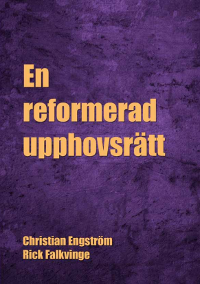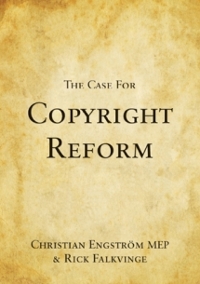I was at a breakfast last week, organized by a network of organizations called Copyright4Creativity. They have presented a platform for sensible copyright reform, highlighting some of the most obvious problems with today’s copyright, and suggesting solutions.
At the breakfast there were Members of the European Parliament from three political groups: Greens, Liberals, and Social Democrats (S&D). The encouraging thing is that we were all pretty much in agreement that we need to solve this problem, and now is the right time.
I think we can build the political momentum to have a copyright reform that legalizes file sharing and makes our common cultural heritage accessible to all. The declaration from Copyright4Creativity is a good starting point.
The signatories of Copyright4Creativity are a number of different NGOs, or non-governmental organizations, representing consumers, librarians, and digital rights activists, among others. They come from different backgrounds, but they have all seen the same problem from their own different angles:
Today’s copyright often serves as an obstacle both to the spreading of knowledge and culture, and to creativity itself.
Two things need to be fixed urgently, to move towards a copyright legislation that is in line with the times.
1. The absurdities
Copyright restrictions prevent blind people from getting access to Braille books that exist, but have been created in another country. We have the technical means to digitize our cultural heritage from the 20th Century, but copyright restrictions prevent it. Public broadcasters can’t make their programs available on the web as they like, due to copyright restrictions.
These are just a few examples out of many, that are all so silly they would be funny, if it wasn’t for the harm they are doing to both people and possibilities.
The problems in this category have two things in common:
One: They can easily be sorted out by defining sensible exceptions and limitations.
And, two: There is no way of finding a solution if the collecting societies and rights holders are given a veto over it, as they have had until now. They have said no for a decade, and will continue to do so.
This should and must be solved by legislators representing the citizens. Fortunately, it is quite straight-forward to do.
2. The file sharing
Trying to stop or reduce file sharing through harsher and harsher legal enforcement doesn’t work. File sharing continues to grow exponentially, no matter what repressive means governments are introducing.
If you think the it would be good if all illegal file sharing disappeared, please feel free to do so (even if I and other Pirates disagree). But that doesn’t alter the fact. Limiting file sharing with laws and punishments doesn’t work. More of the same won’t either. File sharing is here to stay, like it or not.
We should keep copyright, but limit it to when there is commercial intent. All non-commercial copying and use, such as file sharing, should be legalized. We can add this as a limitation in the copyright legislation, in full compliance with the international treaties like Berne and WCT.
What the society has been doing so far isn’t working. There is no way to stop file sharing. It’s time we tried something else.
But how will the artists get paid?
Short answer: Like today, and in other ways that they invent. The cultural sector is making as much money today as it did before file sharing.
It was in 1999 that Napster made file sharing on the Internet available to the public at large, and even though Napster itself has closed down, file sharing has continued to grow year by year since then.
We have ten years of experience as a society as to how file sharing on a massive scale affects revenues for the cultural sector. This means that we don’t have to guess what will happen if file sharing becomes a mass movement. It already has been for a decade, so we can just look at the economic statistics to see what happened.
When look at the statistics, we see that the cultural sector is making as much money now as it did ten years ago (or slightly more, due to the general increase in standard of living). People are spending as much money as ever on culture, regardless of the fact that they can download just about anything for free, and frequently do.
If they no longer spend the money on one thing, they spend it on something else. Music fans are spending just as much money as they used to on music, but since they are spending less on plastic discs, they are spending more on going to live concerts. This is bad news for the record companies, but it is great news for the artists, who get a bigger piece of the pie.
The same amount of money as before goes into the cultural sector, but sometimes through a different route.
It is quite natural that this should be the case, if we think about our own every-day experience of how an ordinary private economy works. When you get a salary every month, you first spend most of it on rent, food, bills, and other boring things. Then, if you’re lucky, you have a little bit left that you can spend on entertainment, i.e.: culture.
If you no longer spend that money on buying plastic discs, you can afford to go and listen to some live music instead. You’re going to spend the money one way or another, so someone in the cultural sector will get it.
When the record companies use the ”every-download-is-a-lost-sale” doctrine, they are implicitly assuming that if file sharing was magically stopped tomorrow, people would suddenly stop paying their rent just so that they could listen to as many new pop albums as they used to. This is of course rubbish.
Almost all people have a fixed budget for culture and entertainment, which they will spend on one thing or another. File sharing is not hurting the artists. Very often it is helping them to cut out the middle men, and get a larger piece of a rather constant pie. This is a good thing, both for the artists as a group and for society as a whole.
Conclusion
Today’s copyright is broken, and needs to be fixed. It has turned an entire generation into criminals in the eyes of the law, and it unduly restricts creativity and access to culture.
But copyright is not beyond repair. The most obvious problems can be quite easily solved by introducing sensible exceptions and limitations, that fit right into the existing legal framework of international copyright treaties.
All it takes is the political momentum to get things moving. I am hoping that we can build that momentum in the European Parliament. I think it can be done.
Let’s make the Copyright4Creativity declaration happen in Europe!
…………
Andra bloggar om: piratpartiet, eu, politik, informationspolitik

 Christian Engström, former Member of the European Parliament 2009-2014 for Piratpartiet, Sweden
Christian Engström, former Member of the European Parliament 2009-2014 for Piratpartiet, Sweden




Finally some positive news 🙂
Kommentar av DanielS — 9 maj 2010 @ 15:00
[…] Posted on 9 maj, 2010 by nejtillpirater Christian Engström, ”Pirate MEP”, skriver om copyright och fildelning på sin blogg. Det är knappast några nyheter, resonemangen är snarare lika felaktiga som de alltid har varit. […]
Pingback av Christian Engström om copyright och fildelning « Nej till pirater och Piratpartiet — 9 maj 2010 @ 15:28
A very interesting proposal, Christian!
I am, however, confused by your specific mentioning of Berne and WCT. Could you please explain to me how a copyright exception covering all non-commercial use would be in line with the three-step test as stated in Berne Art. 9(2) and WCT Art. 10(2)? Enforcing the three-step test is one thing, yes, but as far as I know there is quite the uncertainty regarding ex ante compatibility of such an extensive copyright exception and the limitations set forth by the three-step test.
Kommentar av Johannes Schönning — 9 maj 2010 @ 17:09
@Johannes Schönning:
The easiest proof that such a legislation is possible under all agreements active in the EU is the fact that this is already the case in Spain.
A court there recently found, that in order to infringe somebody’s copyright, you must fulfill both of these two criteria:
1) You must have made money from the action.
2) The copyright holder must have lost money from the action.
This is clearly a way to restate that copyright is a commercial-activity-only monopoly. Since this is active legislation in an EU member state, it can be active legislation in all EU member states without further directives.
But Christian is talking about further directives that weaken, not strengthen, copyright. That makes it even easier.
Kommentar av Rick Falkvinge (PP) — 9 maj 2010 @ 17:41
@Johannes Schönning:
Rick wrote a blog post a couple of years ago that may be relevant in case you want to read more about how he thinks and argues regarding this:
Sverige kan legalisera fildelning imorgon (in Swedish)
Kommentar av Tor M — 9 maj 2010 @ 20:30
[…] An encouraging breakfast 4 copyright « Christian Engström, Pirate MEP […]
Pingback av jardenberg kommenterar – 10 May, 2010 | jardenberg unedited — 10 maj 2010 @ 6:14